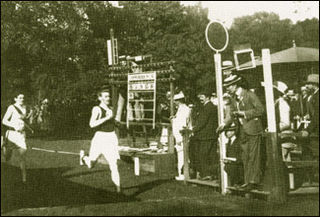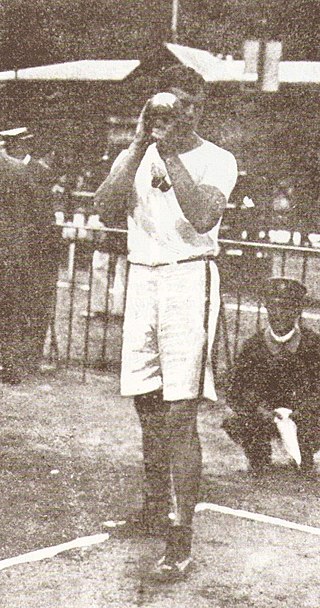Middle-distance running events are track races longer than sprints, ranging from 500 metres up to two miles. The standard middle distances are the 800 metres, 1500 metres and mile run, although the 3000 metres may also be classified as a middle-distance event. The 1500 m came about as a result of running 3+3⁄4 laps of a 400 m outdoor track or 7+1⁄2 laps of a 200 m indoor track, which were commonplace in continental Europe in the 20th century.

Charles Bennett was a British athlete, winner of the 1500 metres at the 1900 Summer Olympics and the first British track and field athlete to become Olympic champion. He was a member of Finchley Harriers which was amalgamated into Hillingdon Athletic Club in 1966.
The men's 800 metres made its fourth Olympic appearance at the 1908 Summer Olympics. The competition was held on July 20, 1908, and on July 21, 1908. The races were held on a track of 536.45 metres=1⁄3 mile in circumference. It was run in two rounds, with the winners of the eight heats of the first round competing in the final.
The men's 1500 metres was an Olympic event for the fourth time at the 1908 Summer Olympics. The competition was held on 13 and 14 July 1908. The races were held on a track of 536.45 metres=1⁄3 mile in circumference. The event was won by Mel Sheppard of the United States, the second consecutive Games an American had won the event. Sheppard, like Jim Lightbody in 1904, would also win the 800 metres for a middle-distance double.

The men's 100 metres was a sprinting event on the athletics programme at the 1900 Summer Olympics in Paris. It was held on July 14, 1900. 20 athletes from nine nations competed. The event was won by Mathew Chay Bender of the United States, the second of three straight gold medals by different Americans in the event. Australia medaled in the event for the first time, a bronze by Stan Rowley.

The men's 200 metres was a sprinting event on the athletics programme at the 1900 Summer Olympics in Paris. It was held on July 22, 1900, well after most of the rest of the athletics events. The 1900 Games were the first time the 200 metres was contested. The races were held on a track of 500 metres in circumference. Eight athletes from seven nations competed. The event was won by Walter Tewksbury of the United States. Norman Pritchard of India took silver while Australian Stan Rowley earned bronze.

The men's 400 metres was a track & field athletics event at the 1900 Summer Olympics in Paris. It was held on July 14, and July 15, 1900. The races were held on a track of 500 metres in circumference. 15 athletes from six nations competed.

The men's 800 metres was middle-distance running event on the athletics programme at the 1900 Summer Olympics in Paris. It was held on July 14 and July 16, 1900. The races were held on a track of 500 metres in circumference. 18 athletes from seven nations competed. The event was won by Alfred Tysoe of Great Britain, the nation's first medal in the event. The United States also won its first medals in the 800 metres, with silver and bronze.

The men's 110 metres hurdles was the first of the track and field events on the athletics programme at the 1900 Summer Olympics in Paris. It was held on July 14, 1900. Nine athletes from three nations competed in the shortest of the hurdling events. The event was won by Alvin Kraenzlein of the United States, the second of five consecutive victories for the nation in the first five Olympic Games. It was also the first of four consecutive podium sweeps for the Americans in the event.

The men's 400 metres hurdles was a track & field athletics event at the 1900 Summer Olympics in Paris. This event was held for the first time at the Olympics. The competition took part on July 14 and July 15, 1900. The race was held on a track of 500 metres in circumference. Five athletes from four nations competed in the longest of the three hurdling events. The event was won by Walter Tewksbury of the United States. Henri Tauzin of France earned silver, while George Orton of Canada took bronze.

The men's 2500 metres steeplechase was a track & field athletics event at the 1900 Summer Olympics in Paris. It was the first time that a steeplechase race was held at the Olympics. The race was held on July 15, 1900, on a 500-metre track. Six athletes from six nations competed in the shorter of the two steeplechase events. The 4000 metre steeplechase race was held one day later. The event was won by George Orton of Canada, the nation's first gold medal in athletics. Sidney Robinson of Great Britain took silver, while Jean Chastanié of France earned bronze.

The men's 4000 metres steeplechase was a track & field athletics event at the 1900 Summer Olympics in Paris. It was one of the first two times that a steeplechase race was held at the Olympics, with the 2500 metres version held one day earlier. The 4000 metres steeplechase was held on July 16, 1900. The race was held on a track of 500 metres in circumference. Eight athletes from five nations competed in the longer of the two steeplechase events. The three medallists from the 2500 metre steeplechase also competed in the 4000. The only one among them to win a second medal was Sidney Robinson, who added a bronze medal to the silver he had won earlier. The gold medal was won by John Rimmer of Great Britain, which completed a medal sweep with Rimmer, silver medalist Charles Bennett, and Robinson.

The men's 5000 metres team race was the final track and field event on the athletics programme at the 1900 Summer Olympics in Paris. It was the first time that a team race was held at the Olympics. It was held on July 22, 1900. Two teams competed: Racing Club de France from France and Amateur Athletic Association of England from multiple nations. Each team had five athletes. The AAA team won the competition, despite Rowley being injured and unable to finish.

The men's triple jump was a track & field athletics event at the 1900 Summer Olympics in Paris. It was held on July 16, 1900. 13 athletes from six nations competed. The event was won by Myer Prinstein of the United States, the nation's second consecutive victory in the men's triple jump. Prinstein became the first, and through the 2016 Games, only, person to have won both the long jump and the triple jump. James Brendan Connolly took second, making him the first man to medal twice in the triple jump. Lewis Sheldon finished third, completing what would later be known as a medal sweep.

The men's shot put was a track & field athletics event at the 1900 Summer Olympics in Paris. It was held on July 14 and July 15, 1900. 11 shot putters from five nations competed. The event was won by Richard Sheldon of the United States, the nation's second consecutive victory in the men's shot put. Josiah McCracken took silver and Robert Garrett took bronze, completing an American medal sweep.

The men's discus throw was a track & field athletics event at the 1900 Summer Olympics in Paris. It was held on July 14 and July 15, 1900. 17 discus throwers from nine nations competed. The event was won by Rudolf Bauer of Hungary, the nation's first victory in the men's discus throw. František Janda-Suk gave Bohemia its first medal in the event, also in that nation's first appearance. Richard Sheldon's bronze put the United States in the top three for the second consecutive Games.
The men's 1500 metres race, the longest flat-track race of the 1896 Summer Olympics programme, was the last event on 7 April. It was run in a single heat, with eight athletes competing.

The men's 200 metres was a track and field athletics event held as part of the Athletics at the 1904 Summer Olympics programme. It was the second time the 200 metres was contested. All races of this competition was held on a straight course. 5 athletes from 3 nations participated. The competition was held on August 31, 1904. The United States swept the medals, with Archie Hahn earning the second of his three sprint medals in St. Louis. Nathaniel Cartmell took silver and William Hogenson earned bronze. It was the second consecutive American victory in the event.

The men's 1500 metres was a track and field athletics event held as part of the Athletics at the 1904 Summer Olympics program. It was the third time the event was held. 9 runners from 3 nations participated. The competition was held on September 3, 1904. The event was won by Jim Lightbody of the United States, completing his 1904 treble. It was the first championship in the event for the United States. The Americans, with 7 of the 9 runners, swept the medals.
The men's 1500 metres event was part of the track and field athletics programme at the 1924 Summer Olympics. The competition was held on Wednesday, July 9, 1924, and on Thursday, July 10, 1924. As for all other races the track was 500 metres in circumference. Forty middle distance runners from 22 nations competed. The maximum number of athletes per nation was 4.













